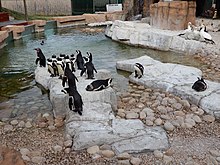Southern African Foundation for the Conservation of Coastal Birds
The Southern African Foundation for the Conservation of Coastal Birds , SANCCOB for short (German for example: "South African Foundation for the Preservation of Birds in the Coastal Zone"), is a South African non-profit organization in the field of nature and species protection . It is the only organization of its kind in South Africa and recognized by the South African Veterinary Council .
SANCCOB was founded in November 1968. The trigger was an oil spill on the coast of South Africa, which was triggered by an increased traffic of oil tankers in the course of the Six Day War in 1967. The initiator was Althea Louise Burman Westphal, who began cleaning oil-contaminated penguins on her private property in Claremont . The biologist Roy Siegfried was one of the founders.
In the first 50 years, SANCCOB employees saved around 95,000 seabirds from 54 species, including various types of penguins, various types of gulls and cape gannets . Initially around 200 on average, around 2500 seabirds are now rescued each year, including around 1500 penguins every year. More than 7,700 penguins were raised between 2001 and 2018. Since 1983, staff and volunteers have cleaned 35,000 oil-contaminated penguins. In the course of the oil disaster triggered by MV Treasure in June 2003, almost 20,000 birds were also evacuated from the danger zone. According to a study by the Percy FitzPatrick Institute of African Ornithology at the University of Cape Town , the population of South African penguins would be a good 20 percent lower without the commitment of the staff and the largely international volunteers. In addition to rescuing and rearing seabirds, the main focus of SANCCOB's work is education and training . Children and young people in particular are addressed through a broad education, information and awareness program.
SANCCOB now has two locations: In the Western Cape Province in Table View , Cape Town within the Rietvlei Wetland Reserve , and in the Cape Recife Nature Reserve in Port Elizabeth . A third station in the Eastern Cape Province at the Seal Point Lighthouse on St Francis Bay in Cape St. Francis was closed in 2018 and the animals were relocated to Cape Recife Nature Reserve in Port Elizabeth. The latter station was taken over by SAMREC , the South African Marine Rehabilitation and Education Center , in April 2017 .
The organization also manages the largest and most important of the five penguin colonies in the Western Cape at Stoney Point . SANCCOB works closely with various domestic partner institutions, including CapeNature , South African National Parks (SANParks) and the Robben Island Museum . There is also a large number of partnerships with zoos and animal parks around the world, including in German-speaking countries the Münster Zoo , the zoo Aachen , the Leipzig Zoo and the Zoo Basel . The organization is based in the Cape Town branch. In addition to the specific bird rescue sites, the stations are equipped with various teaching and conference rooms and libraries. There are also a number of merchandising products whose sales proceeds support the work of the foundation. You can also support the organization with sponsorships for penguins. Stephen van der Spuy is head of the organization with almost 30 employees and many more volunteers, and Mariette Hopley is the chairman of the supervisory board.
Web links
- Homepage (English)
- Flyers and cinematic tour of the station in Port Elizabeth (English)
- Presentation on the information page for visitors and tourists of Nelson Mandela Bay (English)
Single receipts
- ^ DC Nel, RJM Crawford, NJ Parsons: The conservation status and impact of oiling on the African penguin . In: DC Nel & PA Whittington: Rehabilitation of Oiled African Penguins: a Conservation Success Story . BirdLife South Africa and Avian Demography Unit. Cape Town 2003, pp. 1-7.
- ↑ Anonymous: SAMREC transfers Port Elizabeth facility to SANCCOB . Message in 24.com. from March 22, 2017 on www.news24.com (English).

